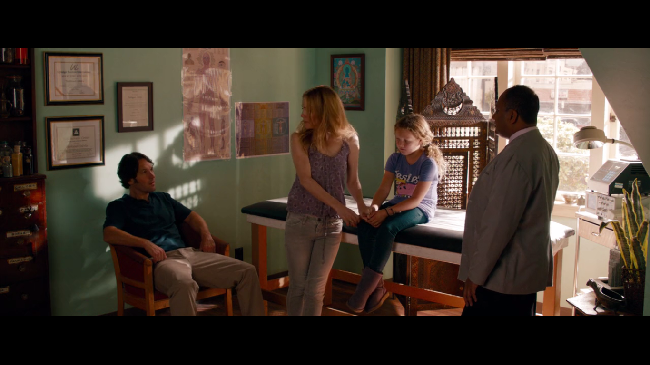Five years after Knocked Up combined romantic comedy codes and fratboy humour to concoct a surprisingly candid look at an unplanned pregnancy and its effect on the lives and growth of its two protagonists, Judd Apatow returns with a “sort-of sequel” that ditches crass jokes in favour of a more restrained though no less overtly comical examination of the married life of Peter and Debbie, a peripheral couple from the original film that served as a quasi-anti-model to protagonists Ben and Alison. In Knocked Up, they were mostly simple and defined primarily by flaws that threatened their marriage – Alison was a control freak, Peter was an immature milquetoast who preferred to retreat into secret juvenile pastimes rather than honestly discuss his feelings with her. Here, they are fully-fledged human beings. More than comical exaggerations of real-life emotions and situations, the daily problems Peter and Debbie encounter in the days leading up to Peter’s 40th birthday draw their effectiveness from Apatow’s refusal to settle for mere laughs.
Consider
for instance Peter’s repeated attempts to get his wife and daughters to
appreciate rock & roll music. A lesser film would be content with mocking either
him for being an embarrassing and hopelessly out-of-touch dad, or his wife and
kids for having shallow taste in music. But Apatow won't content himself with obvious clichés. When Debbie dances with the girls to Nicki Minaj &
Eminem’s “Roman’s Revenge”, neither
Apatow nor Leslie Mann are inciting mockery of her. The scene’s humour comes
less from the communication problems themselves and more from the patience with
which it observes the characters’ reactions to it. And this remains consistent
throughout the film: whether it’s Debbie feeling up her sexy younger employee’s
breasts and lamenting how her daughters “sucked the meat right out” of her own,
or Peter getting guilt-tripped by his mooching father (Albert Brooks) into giving him money, the film never treats its
characters as one-note stereotypes waiting for their turn to push the “laugh”
button. Laughter is caused not by inciting the audience to distance themselves
from them and mock them with the comforting thought that they would never be as
wacky as they are, but rather by reminding them of their own humanity,
recognizing it in those characters and accepting it.
While This Is 40 still uses Hollywood
narrative codes (most of the couple’s
problems are resolved in the last 10 minutes, including a miraculous appearance
by Ryan Adams at the very end that suggests he will save Peter’s record label
from going bust), it avoids artificiality by treating the characters as
only-barely fictionalized embodiments of real people. In that respect, it is
not unlike David O. Russell’s Silver
Linings Playbook, whose narrative conventions were similarly uplifted by
first-rate acting and keen direction that enabled them to coax additional
little truths out of their performances. Among other things, this allows Megan
Fox as Desi – the aforementioned sexy younger employee of Debbie’s clothes
store – to prove that she can act when given a good script and directed as a
human being instead of a sex object. While her body is still the subject of
comments from many characters, it isn’t filmed in a way that reduces her solely
to it. The scene in which she allows Debbie to feel her breasts and express her
admiration and envy for them is filmed mostly in medium shots and medium close
shots that, while giving the audience a good view of her chest, do not focus
the entirety of their attention on them. What matters isn’t Desi’s body so much
as the negative image Debbie expresses of her own body. Fox is not objectified
as she was in Michael Bay’s execrable “Transformers”;
she may be conventionally attractive by Hollywood standards and, as she later
reveals, an escort, but she is not solely defined by her sexuality nor is she
exploited for it. Desi may not the most complex character in the film, but she
is a step up from posing on top of cars and bikes for teenage heterosexual
adolescent male virgins to ogle at.
This Is 40 has been criticized by many reviewers for its
length – 2 hours & 17 minutes – and while it certainly does present flaws,
the fact that it is long is not one of them. What is one of them is the
not-inconsiderate amount of trimming present across the film, obvious results
of compromises to make the film more marketable. Some scenes – such as a visit
to an Indian doctor whose accent Peter mocks – have clearly been cut short and
end somewhat abruptly just before they get too uncomfortable. Similarly,
certain conversations have clearly been abridged; the first party will say
something in one shot, followed by a shot of the other party’s response, which
shows clear signs of not having started quite as presented in the film; there
was perhaps a slight pause or a line or two that the editor removed. In other
cases, the reply clearly came from a different take, as evidenced by
differences in their body’s positioning when compared to a previous wider shot
showing both parties.
More
insightful, subtle and fully-fledged than its predecessor, This Is 40 bears witness to Apatow’s growth as both a filmmaker and
an artist. He isn’t afraid to make his viewers uncomfortable by making his
characters behave and speak in annoying ways, and while the love he has for
them may occasionally impair his judgment – as evidenced by the conclusion of a
subplot involving Peter and Debbie verbally abusing their eldest daughter’s
schoolmate for insulting her online and getting away with it – but given how
complex they are, particularly when compared to most modern comedy characters,
it it is an acceptable price to pay.





No comments:
Post a Comment